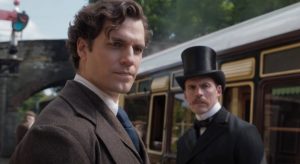Sherlock Holmes is a name recognizable to virtually anyone, thanks to his longevity in both literature and countless film and TV appearances: so it’s understandable that many audiences will approach Netflix’s Enola Holmes (based on the popular book series of the same name) with the assumption that it’s just going to be a fun yet forgettable Sherlock Holmes spinoff. But give it a chance, and I think you may become so obsessed with the film’s intelligent, free-spirited heroine that you might just find yourself wishing for a bit more of her story to be told onscreen. It’s not that Sherlock (Henry Cavill) himself isn’t a major player in Enola Holmes, it’s just that…well, two can play the same game equally well, and Enola Holmes (Millie Bobby Brown, also the film’s executive producer) is more than capable of matching wits with the great detective.

The film hooks you in early, setting the stage for the overarching mystery almost immediately and carrying our heroine on a fast-paced adventure through the English countryside all the way down to London’s bustling streets, giving us respites and occasional breaks along the way but never once derailing the main plot, as many mysteries are apt to do with a multitude of red herrings. Enola Holmes and her mother Eudoria (Helena Bonham Carter, marvelous as always and playing a boldly feminist character similar to her role in Suffragete) live in a somewhat dilapidated manor, where Enola spends her days honing her intellectual and physical skills – everything from reading entire libraries worth of fine literature to mastering the art of jujitsu – in an idyllic safe haven, far removed from the cruel outside world. In Enola and Eudoria’s home, everything is a fun, clever puzzle: in fact, Enola’s own name, backwards, spells out the word Alone – though Enola wryly notes that she might be looking too much into that, as her older brothers Sherlock and Mycroft (Sam Claflin) don’t share that little quirk. But most of the time we spend with Enola and Eudoria in their tranquil, carefree life is via flashbacks interspersed throughout the film at appropriate moments – because, from almost the moment the film opens, Eudoria is missing, and it is her sudden disappearance (on her daughter’s birthday, no less) that springboards the young Enola into the real world, armed with all the knowledge she has obtained from her homeschooling.
What makes Enola Holmes so darn likable, however, isn’t just that she can come up with a daring escape plan in a matter of seconds or take down an armed opponent while wearing the cumbersome fashion of her time period; it’s that she’s distinctly human – she’s nothing like her brother Sherlock, who has a reputation for being cold and emotionless (even in our world; so much so that the Arthur Conan Doyle tried to sue the makers of this film because their Sherlock portrayal was too emotional – and also because this version respects women too much, which, um…we’re not even going to go near that little tidbit of information). Because Enola breaks the fourth wall so frequently and with such humor and self-awareness (at one point even directly asking us, the audience, for ideas during a tricky moment), and because she’s free to make mistakes and slip up every now and again, it’s hard not to root for her – even, and perhaps especially, when her agendas don’t quite line up with Sherlock’s. It’s a testament to the strength of Enola’s character that I found myself actively wishing Sherlock would move aside and let his younger sister take the lead.

It should be stated, however, that Sherlock Holmes’ portrayal here is very nearly as charismatic and compelling as Enola’s. Henry Cavill has quite possibly carved out another niche for himself in yet another franchise, one that I hope he intends to expand upon, if Enola Holmes gets a well-deserved sequel: his Sherlock is instantly familiar and yet so very different from what we’ve seen before – is that because, as has been mentioned, he has emotions and, indeed, respects women in this iteration of the character? Well, I think it might have something to do with that, actually. Cavill’s Sherlock tries hard to maintain his neutrality and facade of cold indifference, but it’s teased throughout the film that he has a certain vulnerability and warmth – something he’s really only ever able to reveal around his sister. Siblings supporting, respecting, and inspiring each other? You know I’m always here for that trope.
On the flip-side you have Enola and Sherlock’s other brother, the mustachioed Mycroft. He never quite twirls said mustache, but he’s the type of character who would if the opportunity arose: he’s deliciously despicable, the type of scummy, sneering elitist whose only motive is to make sure that the world stays firmly as it is. Eudoria’s wild spirit and Enola’s rebellious attitude are direct affronts to him, and he does everything in his power to try and dampen our heroine’s courage with attempts to “civilize” her and transform her into society’s image of a polite young lady of the Victorian era. Though there are several villains in the film, he’s the one who never fails to trip up Enola Holmes by playing on her insecurities and feelings of self-doubt – he’s the living embodiment of everything wrong and corrupt with the status quo, and the fact that he is so laughable and yet so seemingly omnipresent only goes to underline that point. Another key plot-point in the film is a reform bill that is set to go to a vote before the House of Lords – it’s only ever referred to as Reform, and that’s in part because the specifics are unimportant. It represents progress and the overturning of a commonly accepted system of government, and Mycroft Holmes, who expresses his disapproval for the very notion early on, is everything that stands in between us and achieving such radical Reform time and time again. We are still fighting Mycroft Holmes and his infuriating stance of neutrality in 2020: he is everyone screaming “All Lives Matter” in response to the notion that Black lives take precedence at a moment in time where they are the ones being singled out by police brutality and other forms of violence. In a world full of Mycrofts, be a Eudoria or an Enola.
Or be a Lord Viscount Tewksbury (Louis Partridge), who is one of the most surprising characters in the film. I say surprising because the trailer for this film made it seem to me that he was going to be utterly unbearable, with a bad case of “arrogant rich boy”. Quite the opposite: Tewksbury is a free spirit himself, and while, as an upper-class white male, he might personally benefit from the status quo, he nonetheless wants to change it and actively tries to do so. He’s also a mushroom forager and amateur botanist, which is absolutely charming and differentiates him from a long line of previous onscreen royals who spend their days casually maiming nature and wildlife rather than preserving or cultivating it – although, rather surprisingly, his encyclopedic knowledge of plants and flowers is simple a character trait; it has no relevance to the plot, which, considering that the mystery largely revolves around the language of flowers, seems like a missed opportunity.

Now I suppose I really ought to talk about the mystery itself since…well, Enola Holmes is a mystery. Thankfully, it’s a pretty good one: the trail of clues is maybe a bit too difficult to follow at points, and I might have enjoyed more in-depth scenes of clue-hunting that didn’t require so much backtracking (via flashbacks) to an event that we, the audience, didn’t actually see in real-time, but that’s a fairly minor complaint – it certainly didn’t affect my enjoyment of the movie. To counterpoint this complaint with a positive, one of my favorite things about the mystery is that it gets intense, and dark: the film’s villain (no spoilers!) is out to kill, and the fight scenes don’t hold back – Enola is a very convincing action heroine, whose wits and strength are well-balanced. And she makes for a very effective detective, not least of all because her breaking the fourth wall allows her to walk us through her process organically, rather than having to drop loads of clunky exposition, or, like the classic Sherlock, piece everything together silently in her head.
Her instant charm makes her the perfect candidate to lead her own franchise on Netflix, if you ask my opinion (you didn’t, but I offered it anyway because I’m shameless). The film leaves off with plenty of story still to explore…in a sequel, I hope? If Enola Holmes blossoms into a hit for the streaming service, I would love to see the fierce young detective continue to solve cases all around England – with or without the help of her older brother. Sherlock’s name recognition is still potent, and shouldn’t be discounted entirely, but I think – no, I know – that Enola Holmes is her own character, and she can manage just fine alone.
Rating: 8.5/10
